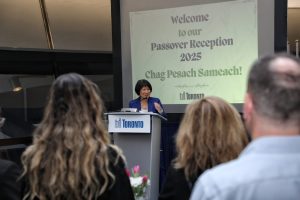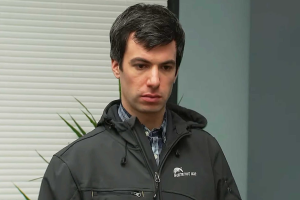At a town hall on community safety and anti-Semitism in Toronto on March 3, MPs from both the Liberal and Conservative parties spoke about the importance of the fact that the leaders of all the major Canadian political parties support Israel and denounce anti-Semitism, and how rare that is in other countries.
The town hall, which was held at Temple Sinai Congregation of Toronto, was in response to the shootings at the Tree of Life synagogue in Pittsburgh, and concerns that Jewish community members have about their safety, in light of rising anti-Semitism worldwide.
After an introduction from Rabbi Daniel Mikelberg, Liberal MPs Michael Levitt and Marco Mendicino and Conservative MP Peter Kent spoke about various community safety initiatives. Four guest speakers also spoke at the town hall: Gerry Almendrades, the Centre for Israel and Jewish Affairs’ (CIJA) security advisor, along with three members of the Toronto Police Service – Supt. Robert Johnson, Insp. Paul Rinkoff and Det. Const. Kiran Bisla.
“It’s really just unfortunate that we need to be, in 2019, packing rooms on this topic,” Levitt continued. “We know what happened in that synagogue on that fateful afternoon could have happened anywhere. It happened in Pittsburgh, but it could have been right here … and the world changed for us, as a Jewish community, after that day.”
In his opening remarks, Kent spoke about how the world has changed recently, and how those changes may be contributing to the rise in anti-Semitism.
READ: SHULS BEEF UP SECURITY FOLLOWING PITTSBURGH ATTACK
“A large part of the problem is generational turnover and consciousness,” he said. He cited a recent CBC article that compared Canadian youths who join the Israel Defence Forces with ISIS recruits as an example of modern anti-Semitism. “It is internationally accepted and recognized today that to question the dual loyalty of a Jew is anti-Semitism,” he said.
Mendicino touched on the various forms that anti-Semitism can take – from harassment and graffiti, to BDS, violence and terrorism. He argued that combating anti-Semitism isn’t just about condemning negative acts, but celebrating positive ones through initiatives such as adopting May as Jewish Heritage Month.
“Those positive acts where we shine a light on the contributions of the Jewish community here in Canada and around the world remind everyone that we truly are stronger together,” he said.
There were a number of messages that the speakers repeated throughout the event. One of the most common was the need to be prepared for all scenarios, and that an important part of that preparation is training all members of a community on how to respond to an incident.
Almendrades talked about the difference between risk and threat, how to keep the two in perspective and how they inform emergency preparedness. “We plan for the most likely, which is the risk, but we keep an eye towards the threat,” he said.
In Toronto, even though Jews have been the most targeted hate crime group, the vast majority of that crime does not involve physical harm. But CIJA still needs to prepare the Jewish community for the potential of violent attacks. That means providing training for members of the community to respond to a crisis. Key skills include first aid and how to effectively communicate information to police and first responders.
Another message that many of the speakers shared was the need for more Jewish history education in Canada. As the Holocaust recedes further and further into the past, there is a loss of “institutional awareness,” to use Kent’s term, meaning younger people are unaware of the history of anti-Semitism and its consequences, and don’t take the reality of it as seriously as they should.






